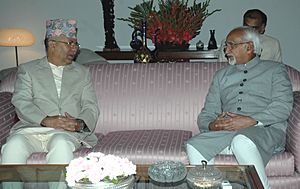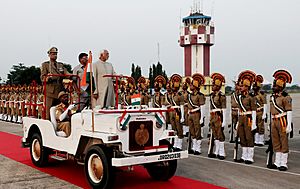Mohammad Hamid Ansari facts for kids
Quick facts for kids
Mohammad Hamid Ansari
|
|
|---|---|
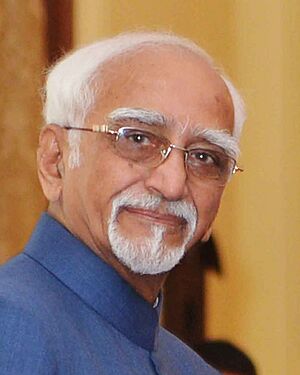
Ansari in 2016
|
|
| Vice President of India | |
| In office 11 August 2007 – 11 August 2017 |
|
| President | Pratibha Patil Pranab Mukherjee Ram Nath Kovind |
| Prime Minister | Manmohan Singh Narendra Modi |
| Preceded by | Bhairon Singh Shekhawat |
| Succeeded by | Venkaiah Naidu |
| Permanent Representative of India to the United Nations | |
| In office January 1993 – January 1995 |
|
| President | Shankar Dayal Sharma |
| Preceded by | Chinmaya Gharekhan |
| Succeeded by | Prakash Shah |
| Ambassador of India to the United Arab Emirates | |
| In office 6 June 1976 – 24 January 1980 |
|
| President | Fakhruddin Ali Ahmed B. D. Jatti (acting) Neelam Sanjiva Reddy |
| Preceded by | S. E. H. Rizvi |
| Succeeded by | Lalit Mansingh |
| Personal details | |
| Born | 1 April 1937 Calcutta, Bengal, British India (present-day Kolkata, West Bengal, India) |
| Political party | Independent |
| Spouse | Salma Ansari |
| Children | 3 |
| Relatives | Afzal Ansari (nephew) Sibgatullah Ansari (nephew) Mukhtar Ansari (nephew) |
| Alma mater | Aligarh Muslim University |
| Awards | Padma Shri |
Mohammad Hamid Ansari (born April 1, 1937) is an Indian leader who worked as a diplomat and later served as the Vice President of India from 2007 to 2017.
He joined the Indian Foreign Service (IFS) in 1961. This meant he represented India in other countries. Over 38 years, he was India's ambassador to countries like Australia, Afghanistan, Iran, and Saudi Arabia. He also represented India at the United Nations from 1993 to 1995. Later, he became the vice-chancellor of Aligarh Muslim University from 2000 to 2002. Before becoming Vice President, he was the chairman of the National Commission for Minorities from 2006 to 2007.
Ansari was first elected as the Vice President of India on August 10, 2007. He started his term on August 11, 2007. He was re-elected on August 7, 2012, and took his oath from Pranab Mukherjee, who was the President of India at that time. His second term began on August 11, 2012. He chose not to run for a third term in 2017. His time as Vice President is one of the longest in Indian history, similar to Sarvepalli Radhakrishnan.
Contents
About Mohammad Hamid Ansari
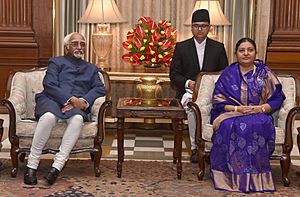
Mohammad Hamid Ansari was born on April 1, 1937, in Kolkata, India. His parents were Mohammad Abdul Aziz Ansari and Aasiya Begum. Even though his family's original home is in Yusufpur, Ghazipur, in Uttar Pradesh, he spent his early years in Kolkata. His family has a long history, connected to the Sufi saint Abdullah Ansari. His ancestors came to India in 1526 with the Mughal emperor Babur.
He is also related to important figures in Indian history. He is the grand-nephew of Mukhtar Ahmed Ansari, who was a president of the Indian National Congress and a freedom fighter. He is also a cousin to three politicians from Uttar Pradesh: Afzal Ansari, Sibaghatullah Ansari, and Mukhtar Ansari.
Ansari went to St. Edward's School, Shimla for his early education. He earned his Bachelor's (B.A.) and Master's (M.A.) degrees in political science from Aligarh Muslim University. He is married to Salma Ansari, and they have two sons and one daughter.
His Career Journey
Diplomatic Roles
After joining the Indian Foreign Service in 1961, Ansari worked in Indian missions in various cities like Baghdad, Rabat, Brussels, and Jeddah. From 1976 to 1980, he was India's ambassador to the United Arab Emirates. During this time, he helped get land for the Indian School from Khalifa bin Zayed Al Nahyan. He also served as India's ambassador to Australia (1985–1989), Afghanistan (1989–1990), Iran (1990–1992), and Saudi Arabia (1995–1999).
From 1993 to 1995, he was India's permanent representative of India to the United Nations. This means he was India's main voice at the UN. His colleague, T. P. Sreenivasan, noted that Ansari strongly defended India against false claims about human rights abuses in Jammu and Kashmir. His appointment showed India's commitment to being a fair and diverse nation.
Academic Work
After his diplomatic career, Ansari became a visiting professor at Jawaharlal Nehru University from 1999 to 2000. On May 23, 2000, he was appointed as the vice-chancellor of Aligarh Muslim University. After leaving this role in 2002, he was a visiting professor at Jamia Milia Islamia from 2003 to 2005.
Leading the National Commission for Minorities
On March 6, 2006, Ansari became the chairman of India's National Commission for Minorities (NCM). This commission works to protect the rights of minority groups in India. In June 2007, he supported a decision by St. Stephen's College in Delhi to reserve some seats for Dalit Christians. He resigned from this position when he was nominated to become India's Vice President.
Vice Presidency (2007–2017)
First Term as Vice President
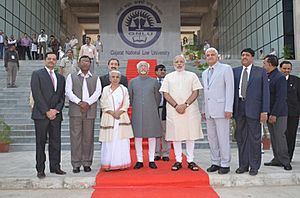
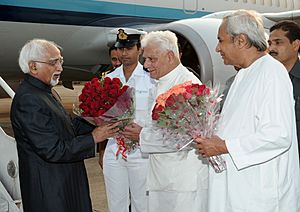
On July 20, 2007, the ruling group in India, the UPA-Left, chose Ansari as their candidate for Vice President. Ansari said he felt "humbled" by their decision. He won the 2007 Indian vice-presidential election by a large number of votes against his opponent, Najma Heptullah.
Second Term as Vice President
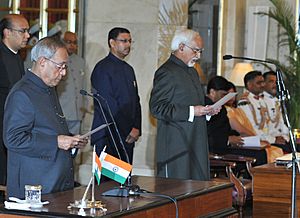
For the 2012 Indian vice-presidential election, the UPA again nominated Ansari. The opposition group, the NDA, nominated Jaswant Singh. The NDA criticized Ansari's actions in the Rajya Sabha (one of India's parliament houses) during a debate on a bill. However, Hamid Ansari was re-elected on August 7, 2012. He won against Jaswant Singh by a significant margin. Ansari was the first person to be re-elected as Indian Vice President since Sarvepalli Radhakrishnan in 1957.
When Ram Nath Kovind became President of India in 2017, Ansari became the first Indian Vice President to serve under three different Presidents. He holds the record for the longest time served as Vice President of India.
His Views and Contributions
Ansari is an expert on West Asia. He has written about the Israeli–Palestinian conflict and has expressed opinions that sometimes differed from India's official stance on countries like Iraq and Iran. For example, he questioned India's vote against Iran's nuclear program at the International Atomic Energy Agency. He believed India's decision was not fully based on its own judgment.
In 2006, he led a group focused on building trust among different communities in Jammu and Kashmir. This group's report was accepted in 2007. One important recommendation was to recognize the right of Kashmiri Pandits to return to their original homes. The report stated this right should be clear and part of state policy.
See also
 In Spanish: Mohammad Hamid Ansari para niños
In Spanish: Mohammad Hamid Ansari para niños
- List of vice presidents of India
- Syed Akbaruddin
 | Delilah Pierce |
 | Gordon Parks |
 | Augusta Savage |
 | Charles Ethan Porter |


